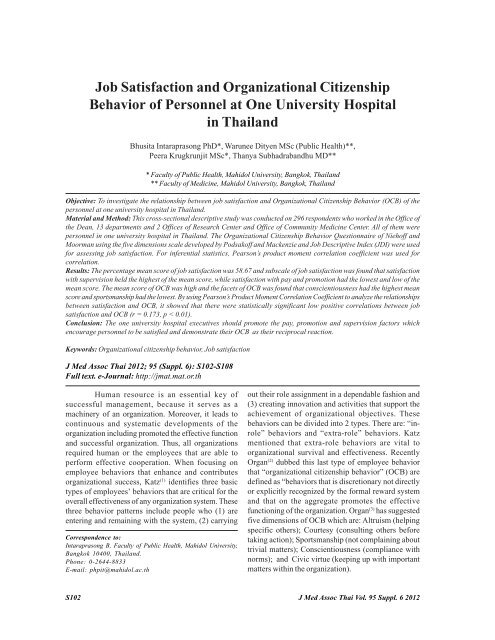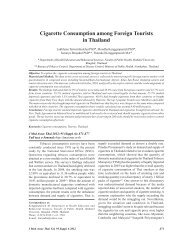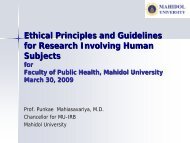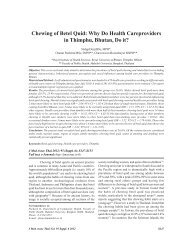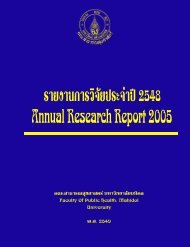Job Satisfaction and Organizational Citizenship Behavior of ...
Job Satisfaction and Organizational Citizenship Behavior of ...
Job Satisfaction and Organizational Citizenship Behavior of ...
You also want an ePaper? Increase the reach of your titles
YUMPU automatically turns print PDFs into web optimized ePapers that Google loves.
manifested OCB, they were also satisfied with theirjobs.The result <strong>of</strong> the present study was consistentwith the present study <strong>of</strong> Bateman & Organ (20) , whichfound a significant relationship between generalmeasures <strong>of</strong> job satisfaction <strong>and</strong> supervisory ratings<strong>of</strong> citizenship behavior. Cross-lagged pattern <strong>of</strong> therelationships between OCB <strong>and</strong> specific facets <strong>of</strong> jobsatisfaction revealed essentially the same results asoverall satisfaction. Bolon (21) examined the relationshipbetween organizational commitment <strong>and</strong> OCB with 202employees in tertiary hospital in the southeastern UnitedState, it showed a significant <strong>and</strong> positive relationshipbetween OCB <strong>and</strong> overall job satisfaction. Lampert (22)examined the relationship between OCB <strong>and</strong> jobsatisfaction, turnover intent, life satisfaction <strong>and</strong> jobburnout, it showed that OCB had a significant positiverelationship with job satisfaction <strong>and</strong> life satisfaction,<strong>and</strong> a significant negative relationship with turnoverintent <strong>and</strong> the three areas <strong>of</strong> job burnout <strong>of</strong> emotionalexhaustion, depersonalization <strong>and</strong> perceived ineffectiveness at work. Metee Sriviriyalertkul (23)surveyed 392 employees from a large company <strong>and</strong>found a significant relationship between job satisfaction<strong>and</strong> OCB. In the present study yielding similar results,Murphy et al (17) examined the relationship between OCBwith 33 human service workers showed that OCB wascorrelated to job satisfaction. In addition, a survey <strong>of</strong>pr<strong>of</strong>essional nurse in region hospital center, AmpornPornpongsuriya (15) revealed that overall job satisfactionwas significantly <strong>and</strong> positively related at the moderatelevel to OCB. And the result <strong>of</strong> the present studysupported the concept <strong>of</strong> Organ (3) to mention that whenemployees are satisfied with their jobs, they reciprocate.This reciprocation includes attachment to theorganization <strong>and</strong> behavior such as organizationcitizenship. Dissatisfied people can choose to do less<strong>of</strong> it without incurring the risk <strong>of</strong> sanctions or lostbenefits. Because cutting back on OCB does not hurtthe ego, as would inferior task performance. In additionit consistent with Dyne et al (27) mentioned that positivejob attitudes or satisfaction leads to individualwillingness to cooperate <strong>and</strong> willingness to contributeto cooperative system that leads to OCB.When focusing on sub-variables <strong>of</strong> OCB, itwas found that altruism, courtesy <strong>and</strong> sportsmanship<strong>of</strong> the personnel were high. They manifest theirbehaviors such as; helping the others who have workloads or who have been absent; willingly taking his/her time to help those who were busy <strong>and</strong> assisting toorientate new people. Courtesy <strong>of</strong> the personnelshowed these behaviors such as; consulting with thosewho might be affected by his/her actions or decision,not infringing the right <strong>of</strong> others, taking steps to preventproblems with other workers, informing others beforetaking any important actions. Sportsmanship <strong>of</strong> thepersonnel compared to the other behavior, it had thelowest mean score. Since some personnel manifestedthe behaviors that did not encourage/promotesportsmanship behavior. For example, they consumedtoo much time complaining about trivial matters, madeproblems look bigger than they were, constantly talkedabout their desires to quit his/her job, always focusedon the negative side rather than the positive side.Conscientiousness-the mean score <strong>of</strong> this was 4.61(SD = 0.45) <strong>and</strong> it was the highest than the others. Itimplied that conscientiousness <strong>of</strong> OCB <strong>of</strong> the personnelwas highest. They manifested <strong>of</strong> conscientiousnessbehavior e.g. they were always punctual, had nevertaken long lunch or break, did not take extra break <strong>and</strong>followed company rules, regulations <strong>and</strong> proceduresalthough nobody was watching.Any organizations can be successful <strong>and</strong>effective if their personnel not only entered <strong>and</strong>remained with the system or carried out their roleassignment but they also performed extra-role behaviorsor ‘OCB’. The result <strong>of</strong> the present study showed thatOCB was positively related to job satisfaction. It wasindicated that if the personnel were satisfied with theirjob at the high level, they also expressed their behaviors,which enhanced the efficient organizations to reachthe high level as well. Thus, the executives shouldpromote the factors that encouraged the personnel tobe satisfied, especially, pay factor <strong>and</strong> promotion factor,the result <strong>of</strong> the present study showed that thepersonnel satisfied with these factors were trivialnevertheless, promotion factor was not related to OCBbut advocating opportunities for promotion that torespond the basic needs <strong>of</strong> human. Future researchmight assess the level <strong>of</strong> job satisfaction <strong>and</strong> OCB <strong>of</strong>the personnel in each workplace or in each pr<strong>of</strong>ession.AcknowledgementThe authors wish to thank all the respondentsin the present study.Potential conflicts <strong>of</strong> interestNone.References1. Katz D. Motivational basis <strong>of</strong> organizationalbehavior. Behav Sci 1964; 9: 131-46.S106 J Med Assoc Thai Vol. 95 Suppl. 6 2012
2. Organ DW. <strong>Organizational</strong> citizenship behavior:the good soldier syndrome. Lexington, MA:Lexington Books; 1988.3. Organ DW. The applied psychology <strong>of</strong> workbehavior: a book <strong>of</strong> readings. Boston: Richard D.Irwin; 1991.4. Bateman TS, Organ DW. <strong>Job</strong> satisfaction <strong>and</strong> thegood soldier: The relationship between affect <strong>and</strong>employee “citizenship.” Acad Manage J 1983; 26:587-94.5. Organ DW, Podsak<strong>of</strong>f PM, Mackenzie SB.<strong>Organizational</strong> citizenship behavior: Its nature,antecedents, <strong>and</strong> consequences. Washington,D.C.: Sage Publications; 2006.6. Organ DW, Hamner WC. <strong>Organizational</strong> behavior:an applied psychological approach. Dallas:Business Publication;1982.7. Muchinsky PM. Psychology applied to work.California: Brooks/Cole Publishing; 1993.8. Strees RM. <strong>Organizational</strong> effectiveness: abehavioral view. California: Goodyear Publishing;1977.9. Chen XP, Hul C, Sego DJ. The role <strong>of</strong> organizationcitizenship behavior in turnover: conceptualization<strong>and</strong> preliminary tests <strong>of</strong> key hypothesis. J ApplPsychol 1998; 83: 922-31.10. Organ DW. The motivational basis <strong>of</strong>organizational citizenship behavior. Greenwich, CT:Research in <strong>Organizational</strong> <strong>Behavior</strong>; 1990.11. Farh JL, Podsak<strong>of</strong>f PM, Organ DW. Accountingfor organizational citizenship behavior: leaderfairness <strong>and</strong> task scope versus satisfaction. Journal<strong>of</strong> Management 1990; 16: 705-721.12. Moorman RH. The Influence <strong>of</strong> cognitive <strong>and</strong>affective based job satisfaction measures on therelationship between satisfaction <strong>and</strong> organizationalcitizenship behavior. Hum Relat 1993; 46;759-76.13. Moorman RH, Nieh<strong>of</strong>f BP, Organ DW. Treatingemployees fairly <strong>and</strong> organizational citizenshipbehaviors: Sorting the effects <strong>of</strong> job satisfaction,organizational commitment, <strong>and</strong> procedural justice.Employee Responsibilities <strong>and</strong> Rights Journal1993; 6: 209-25.14. Organ DW, Konovsky M. Cognitive versusaffective determinants <strong>of</strong> organizational citizenshipbehavior. J Appl Psychol 1989; 74: 157-64.15. Pornpongsuriya A. Relationships between jobsatisfaction, organizational justice, <strong>and</strong> organizationalcitizenship behavior as perceived bypr<strong>of</strong>essional nurses, regional hospital <strong>and</strong> medicalcenters [thesis]. Bangkok: ChulalongkornUniversity; 2001.16. Alotaibi AG. Antecedent <strong>of</strong> organizationalcitizenship behavior: A study <strong>of</strong> Public personnelin Kuwait. Publ Person Manag 2001; 30: 363-76.17. Murphy G, Athanasou J, King N. <strong>Job</strong> satisfaction<strong>and</strong> organizational citizenship behavior: a study<strong>of</strong> Australian human-service pr<strong>of</strong>essionals. JManag Psychol 2002; 17: 287-97.18. Nieh<strong>of</strong>f BP, Moorman RH. Justice as a mediator <strong>of</strong>the relationship between methods <strong>of</strong> monitoring<strong>and</strong> organizational citizenship behavior. AcadManage J 1993;36: 527-556.19. Smith PC, Kendall LM, Hulin CL. The measurement<strong>of</strong> satisfaction in work <strong>and</strong> retirement. Chicago,Illinois: R<strong>and</strong> McNally; 1969.20. Bateman TS, Organ DW. <strong>Job</strong> satisfaction <strong>and</strong> thegood soldier: the relationship between affect <strong>and</strong>employee “citizenship”. Acad Manage J 1983; 26:587-94.21. Bolon DS. <strong>Organizational</strong> citizenship behavioramong hospital employees: a multidimensionalanalysis involving job satisfaction <strong>and</strong> organizationalcommitment. Hosp Health Serv Adm 1997;42: 221-41.22. Lambert EG. The relationship <strong>of</strong> organizationalcitizenship behavior with job satisfaction, turnoverintent, life satisfaction, <strong>and</strong> burnout amongcorrectional staff. Criminal Justice Studies 2010;23: 361-80.23. Sriviriyalertkul M. The relationship betweenorganizational citizenship behavior with jobsatisfaction <strong>and</strong> the performance <strong>of</strong> one privateorganizational employees [thesis]. Bangkok:Thammasat University; 1999.24. Dyne LV, Graham JW, Dienesch RM. <strong>Organizational</strong>citizenship behavior: construct redefinition,measurement, <strong>and</strong> validation. Acad Manage J 1994;37: 765-802.J Med Assoc Thai Vol. 95 Suppl. 6 2012S107
ความพึงพอใจในงานและการเป็นสมาชิกที่ดีในองค์การของบุคลากรโรงพยาบาลมหาวิทยาลัยในประเทศไทยภูษิตา อินทรประสงค์, วารุณี ดิษฐ์เย็น, พีระ ครึกครื ้นจิตร, ธันย์ สุภัทรพันธุ ์วัตถุประสงค์ : เพื่อวิเคราะห์ความสัมพันธ์ระหว่างความพึงพอใจในงานและการเป็นสมาชิกที่ดีขององค์การของบุคลากรโรงพยาบาลมหาวิทยาลัย ในประเทศไทยวัสดุและวิธีการ: เป็นการศึกษาเชิงบรรยาย กลุ ่มตัวอย่างคือ บุคลากรโรงพยาบาลมหาวิทยาลัยที ่ทำงานในสำนักงานคณบดี ภาควิชา 13 ภาควิชา และ สำนักงานวิจัย และสำนักงานศูนย์เวชศาสตร์ชุมชน จำนวน 296 คนแบบสอบถามการเป็นสมาชิกที่ดีขององค์การของนีฮอฟและมูแมน ซึ่งพัฒนาโดยพอสคอฟและแมคเคนซี่และแบบสอบถามดัชนีลักษณะงานเพื่อประเมินความพึงพอใจในงาน โดยใช้สถิติสหสัมพันธ์เพียร์สันในการวิเคราะห์ข้อมูลผลการศึกษา : ความพึงพอใจในงานมีค่าร้อยละคะแนนเฉลี ่ยเท่ากับ 58.67 ความพึงพอใจในงานด้านการนิเทศงานมีคะแนนเฉลี ่ยมากที ่สุด ความพึงพอใจในค่าจ้างมีคะแนนเฉลี ่ยน้อยที ่สุด การเป็นสมาชิกที ่ดีขององค์การมีคะแนนเฉลี ่ยอยู่ในระดับสูง และพฤติกรรมสำนึกในหน้าที่มีคะแนนเฉลี่ยมากที่สุด พฤติกรรมการมีน้ำใจนักกีฬามีคะแนนเฉลี่ยน้อยที่สุด ผลการวิเคราะห์ความสัมพันธ์ด้วยสถิติสัมประสิทธิ์สหสัมพันธ์แบบเพียร์สัน พบว่า ความพึงพอใจในงานมีความสัมพันธ์ทางบวกระดับต่ำอย่างมีนัยสำคัญทางสถิติกับการเป็นสมาชิกที่ดีขององค์การ (r = 0.173, p


